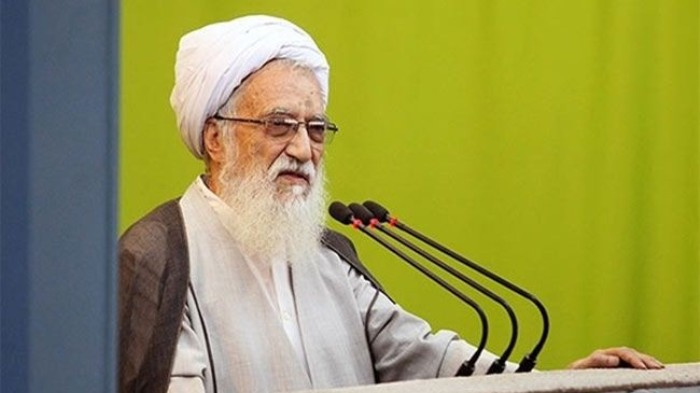Friday Prayers’ Sermons: No Rapprochement with Washington

(Ayatollah Movahhedi Kermani delivering a sermon in Tehran's Friday prayers; credit: yjc.ir)
Nothing is going to change. This was the gist of this week’s Friday prayers.
From Tehran to Mashhad to Kashan, sermonizers reminded their audience of the malicious nature of the West, particularly the United States, and reemphasized that the nuclear talks were an isolated case of negotiation with the Great Satan.
In Tehran, Hassan Rahimpour Azghadi, a key ideologue of the Principlist front, ran a tirade against Hassan Rouhani’s foreign policy, criticizing the wave of diplomatic visits that brought Western officials to Tehran. Speaking before the main sermon, Azghadi stated: “Some are saying that they [the Westerners] are respecting us more than before, when we used to chant Death to America, and that Westerners are now eager to meet us. [If that is the case, then] Westerners were much more eager to meet [Mohammad-Reza] Shah.”
Rahimpour also echoed Ayatollah Khamenei’s warnings about Washington’s plots for Iran in the post-deal era and their plans to ‘paralyze’ Iranian culture: “Cultural paralysis is more dangerous than political, military or even economic paralysis,” he said, adding that according to the late Ayatollah Khomeini “the US is not dangerous per se, it is ineptitude against the US that is dangerous.” Rahimpour, along with other preachers, offered a Principlist version of ‘compartmentalization’ (a strategy that accelerated the resolution of the nuclear dilemma): negotiations with the United States were approved merely for the nuclear program, and not for any other bilateral issue.
The main sermon speaker of Tehran’s Friday prayers Ayatollah Movahhedi Kermani followed the same line. “The US is the same criminal as it was before,” he reminded the audience, criticizing Western officials’ call for change in Iran’s behavior. “Not only will Iranians not change, but against your will, they will also move faster in their revolutionary path,” he vaunted. He also warned about the US’ intention to ‘infiltrate’ Iran and the region in order to promote its “decadent culture” and preferred model of economy. “Do not be fooled by these smiles,” he said.
In Mashhad, the second largest Iranian city, Ahmad Allamolhoda was also sharp-tongued in criticizing the US and also those who ‘daydream’ about the US or Europe regaining a foothold in Iran. He slammed “poisonous pens” active in Iranian cyberspace trying to promote the end of anti-imperialism. Allamolhoda also tried to distinguish between ‘moderation’, Rouhani’s motto, and ‘normalization’ which could lead to ‘abandonment of the Death to America slogan’ and ‘reopening of the US embassy’. He also expressed concern about recent visits to Iran by foreign officials: “the European traffic of last week is dangerous,” he said, giving the government a dubious compliment: “the government has taken an upright stance, but this development makes one concerned.” He minced no words in speaking of Europeans: “In our records of the Europeans, we have seen nothing but theft and murder.”
In Kashan, in central Iran, Friday Prayer leader Ayatollah Namazi provided first-hand evidence to convince the audience that the nuclear talks were an exceptional case in Iran-US relations. According to Namazi, Iran’s Supreme Leader Ayatollah Khamenei has instructed the foreign ministry officials that no more phone conversations should take place between the Iranian foreign minister and his American counterpart now that the negotiations are over. “John Kerry has called several times to speak to Iran’s foreign minister,” the ayatollah said, “but Zarif has refused to speak.” He claimed that Zarif has even declined to introduce a third person to speak on his behalf to the US Secretary of State.

